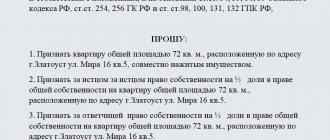General and personal business in marriage
The property of spouses is written in Chapter 7 of the Family Code. Property in marriage can be personal or shared. It's the same with business.
General business
By default, all purchases, money and business of the spouses become common. It doesn’t matter who in the couple the property is registered in, or who brought the money into the house. The law calls this a regime of joint ownership, and things and money are jointly acquired property. The business is considered joint, even when the second spouse does not participate in it and is not listed in the documents. The official husband has rights to the share of his wife’s LLC, despite the ban on doing business. And the entrepreneur’s assets also belong to his wife on maternity leave.
During a divorce, the common business is divided in half. The spouse receives 50% of the individual entrepreneur's assets or half the share of the LLC.
For example, the husband owns a taxi service. The business has computers for dispatchers, a taxi calling program and money in its accounts.
In the case of an LLC, the wife will receive a 50% share in the authorized capital. In other words, the opportunity to receive half the profit from the business. The money, computers and software will continue to belong to the LLC.
In the case of an individual entrepreneur, the wife will receive the right to 50% of the money, computers and programs.
Personal business
The business that started before marriage remains personal. It is not divided in a divorce.
However, it is important to remember the difference between an LLC and an individual entrepreneur:
- The share of the LLC will not become common if the spouse bought it before the stamp in the passport.
- The pre-marital property of an individual entrepreneur will be his personal property. But here you need to look at each asset. In the example about the taxi service, it may be that the husband had the program before the wedding, and computers were purchased afterwards using money shared with his wife. It turns out that the program is personal, and the computers are shared - only they share.
According to the law, there are cases when a business is personal, although it appeared during marriage:
The spouse received the share or asset by inheritance or as a gift . For example, the wife received half of the company after the death of her father. Or the entrepreneur was given computers for dispatchers by his mother.
The spouse bought the share or asset with money earned before marriage . The entrepreneur developed a taxi service long before his wedding. Over the last year I have been saving money to upgrade the control room. After the wedding, he bought computers - they are his personal.
An entrepreneur's asset is the result of intellectual activity, and he is the author . If in our example the husband writes a program for a taxi himself, this asset will become his personal one.
The share or asset appeared when the spouses separated, but have not yet divorced . Here, only a court can recognize property as personal. The wife moved to a rented apartment and six months later opened an LLC. Six months later she got divorced. She has a chance that her husband will not sue half of the business.
The Supreme Court clarified how the property of entrepreneurs should be divided during a divorce
Collage: Legal.Report The actual transfer of funds to the account of one of the entrepreneurial spouses after divorce does not deprive the former spouse of the right to receive part of these funds upon their division. This clarification is contained in the review of the judicial practice of the Supreme Court of the Russian Federation.
In 2021, an individual entrepreneur and founder of a number of companies from St. Petersburg divorced his wife. The former couple began to divide their joint property through the courts. Among other things, the ex-wife demanded to divide 10.9 million rubles, credited to the businessman’s bank account after the actual termination of the marriage relationship. The plaintiff alleged that her ex-husband received income for work and services performed during the marriage.
The Oktyabrsky District Court of St. Petersburg considered that the disputed amount is the personal property of the entrepreneur and is not subject to division. The joint property of the spouses includes only business income transferred to the family budget, the court of first instance indicated. The St. Petersburg City Court agreed with this position. The appellate instance also pointed out that there was no evidence that the obligations under the contracts, in fulfillment of which the entrepreneur received the disputed amount, arose in the interests of the family.
The Judicial Collegium for Civil Cases of the Supreme Court recognized that the conclusions of the lower courts were made with a significant violation of the norms of substantive law.
The Supreme Court indicated that the circumstance that is important for the correct resolution of this case is the period when the individual entrepreneur acquired the right to receive consideration (monies) for transactions, which the plaintiff considers to be the common property of the spouses. At the same time, the defendant did not dispute that the disputed funds were income from business activities carried out during the marriage and were received after the termination of the marriage relationship.
The Supreme Court also rejected, as a basis for refusing the claim, the judgment that there was no evidence that the obligations under the contracts, in pursuance of which the entrepreneur received the disputed amount, arose in the interests of the family. The court referred to Art. 34 of the RF IC, where it is presumed that income from business activities belongs to the common property of the spouses.
Since the business activity was carried out during the marriage and the conditions of this activity provided for the receipt of income from it, the actual transfer of funds to the defendant’s account after the termination of the marriage with the plaintiff does not change their regime for the common property of the spouses and does not deprive the ex-spouse of the right to receive part of these funds when they are divided on the basis of Art. 38, 39 of the RF IC, the Supreme Court indicated.
The case was returned to the trial court. The Supreme Court noted that during a new consideration it should be, in particular, in accordance with the requirements of Part 2 of Art. 56 of the Code of Civil Procedure of the Russian Federation, determine the total amount of the defendant’s income for a legally significant period from the transactions referred to by the plaintiff, taking into account the corresponding costs incurred by the individual entrepreneur in the process of obtaining entrepreneurial activity.
How LLCs and individual entrepreneurs are divided during a divorce according to the law
As we have already said, each spouse receives half of the jointly acquired property. This does not mean that you have to divide every item in half.
Ideally, spouses agree on who gets what. For example, the apartment and share remain with the wife, but the husband does not pay the mortgage. The terms are written down in the agreement and certified by a notary.
The usual story is that spouses argue, so they go to court. Then the court decides who should give what.
Most often, the business is rightly left to the spouse who was involved in it. This rule is not in the law, this is how court practice develops. But sometimes the share is divided in half. Then a new participant will appear in the business, which is not always good.
- If one spouse is given a share of the LLC, the other is awarded compensation at half the cost.
In one case, the husband was awarded a nominal value of 7,000 rubles - apparently, the business was not of particular value. In another case, the wife received compensation based on the market value of the share in 4,986,000 rubles. - The same principle applies to individual entrepreneur assets.
One was given the property, the other was compensated for half. For example, a husband who was engaged in cargo transportation was left with two Kamaz trucks, a trailer and a Chevrolet Niva, and was ordered to pay his wife half of their total market value.
There are rarely situations where spouses share only a business. They usually argue about everything at once: an apartment, a car, a set of red antique chairs and a share in society. An entrepreneur can give away other property for the business, for example, a car. This is a way to save business.
Quietly transferring your business to a trusted friend is a bad idea. The LLC share is sold with the notarized consent of the spouse, which he most likely will not give. It is possible to sell IP equipment. But there will be a suspicion that the spouse has withdrawn the marital property, and the court will return everything back.
The court on division has three years from the moment when the spouses began to argue over property. This is stated in paragraph 19 of the Resolution of the Plenum of the Armed Forces of the Russian Federation No. 15 dated November 5, 1998. It is a mistake to think that three years are counted from a divorce. It may turn out that the ex-spouse will sue in five years, when the business becomes successful - and it will have to be divided. Or even after the death of an entrepreneur. It happens.
Individual entrepreneur loans will also be divided in half between spouses. However, this will happen with any borrowed money, but this is a topic for a separate article.
Forms of dividing individual entrepreneurs during divorce
Many married couples who have a common business and are about to separate, the question arises: is it possible to divide an individual entrepreneur during a divorce.
The Family Code and the Law of the Russian Federation provide for the following forms of distribution of common property:
- Division of all property, income and debts equally. This is the most common way to get out of this situation. All valuables and property are subject to assessment by an expert, after which the share of each spouse is determined in court.
- Providing compensation. If the wife or husband wants to keep the entire business, you can offer the other party monetary compensation equal to the value of his share.
- Conclude a settlement agreement. According to current legislation, property can be divided into any shares if it suits both parties.
Prenuptial agreement and separation agreement - so that the business becomes only yours
To avoid dividing property during a divorce, spouses draw up a prenuptial agreement or separation agreement.
Marriage contract
The rules of the marriage contract are prescribed in Chapter 8 of the Family Code.
Spouses enter into a prenuptial agreement if they do not want to divide property equally. They seem to say: “Everything we buy and earn does not become common.”
The conditions for the contract can be chosen differently. For example, that the property will be the personal property of the spouse in whose name it is registered. This is exactly what you can do with the share of an LLC and the assets of an entrepreneur.
You can determine shares in property - establish shared ownership. And also immediately agree on who will get what in the divorce. Even if the spouses go to court, the business will be divided according to the contract, and not according to the law.
You can agree on a business that you already have or that you are planning to open. It is legal.
In principle, a prenuptial agreement resolves any issues regarding property and money. You can't just mix in human relationships. For example, write that the spouse will lose the business for treason.
The terms of the marriage contract must be fair. If it turns out that one spouse gets everything in life and the other gets nothing, the court will cancel the contract.
After ten years of family life, the couple entered into a marriage contract. They had a house of 70 square meters on a large plot, a two-room apartment, a boat and a Toyota car. Only ¼ share in the apartment is registered to the wife. The rest was registered in the name of the husband.
According to the contract, the property belonged to the spouse in whose name it was registered. That is, almost everything acquired went to the husband.
The husband died and the wife was left with three children. Then she challenged the marriage contract. The court considered that such a imbalance in conditions was unfair. The contract was canceled and the wife received half of the property.
A prenuptial agreement is concluded before the wedding or at any time after. At least the day before the divorce.
The contract is certified by a notary. The service costs 500 ₽ at the Tax Code rate. But in reality, they will charge spouses from 5,000 rubles. This is a fee for text and legal expertise.
Once the contract is signed, you cannot refuse simply because enlightenment has arrived. Just negotiate with your spouse about termination and go to the notary again.
Even when an entrepreneur has problems and debts, he notifies creditors about the prenuptial agreement. Otherwise, in case of bankruptcy it will be canceled.
Agreement on the division of common property
The agreement divides specific property that appeared during the marriage. What is not shared remains common for the spouses.
In this way, you can divide the share of the LLC and the assets of the entrepreneur. This can be done in marriage, when the relationship is normal. Or you can during a divorce, so as not to get involved in an expensive legal dispute.
The division agreement is drawn up by a notary. They pay 0.5% of the value of the property. Therefore, an assessment of the market value of a share or assets is ordered.









